形容词和副词用法总结归纳讲解
第三章
形容词用来修饰、说明名词或不定代词,表示人或物的性质、特征和状态。而副词是用来修饰动词、形容词、其他副词或整个句子,有时也能修饰名词,表示时间、地点、方式、程度等。何时用形容词何时用副词是许多同学搞不清楚的地方。一些常见形容词、副词的区别也是高考的一个重点。
第1讲 形容词和副词的选用
形容词和副词
考点1.
根据所作的句子成分选用形容词和副词
修饰动词、形容词、副词或整个句子用副词,这时,副词作状语;作定语、表语和补语时一般用形容词。 可简单归结为:形作“定表补”;副修“副句形动”(可谐音记为“付诸行动”),常做状语。
常见的使用形容词的情况:作表语、定语、补语。 He is a careful boy.(作定语,用形容词) He is careful.(作表语,用形容词)
You must keep your eyes closed. (作宾语补足语,用形容词)。 常见的使用副词的情况:修饰动词、形容词、副词和整个句子。
He writes carefully. He walks slowly.
(认真地写,慢慢地走,修饰动词用副词) This material is environmentally friendly. (修饰形容词用副词)
He runs very slowly.
(修饰副词slowly, 因此very是副词) Unfortunately, he lost all of his money. (修饰整个句子用副词)
Ⅰ. 用括号内词的形容词或副词形式的适当形式填空, 并说明为什么用这种形式。
1. This math problem is _____ and I can work it out _____.(easy) 2. There was a _____ wind last night, it blew _____.(strong) 3. The boys have a _____ time, they’re playing _____.(happy) 4. The_____ girl sings very _____. (beautiful) 5. “I’ve missed it,” Robert said _____. (angry)
6. _____(surprising), he returned safe and sound (安然无恙
地) the next morning. 7. _____ (hope), he can get on well with all his classmates in
the new school. 8. _____, he didn’t fail in the exam.(luck)
9. He was _____ ill and I was _____ sorry for that. (terrible) 10. It was _____ (extreme) cold that day and the meeting was
_____ (especial) important. 11. He is an _____ singer and he sings _____ well. (incredible) Ⅱ. 选择括号内的形容词或副词填空。
The hikers were walking (1.slow/slowly) up the mountain path. Suddenly, they saw a large creature above them. It looked very (2. strange/strangely), with a large head and thick black hair. The creature screamed (尖叫) (3. loud/loudly. )It sounded (4.horrible /horribly), like the scream of a mad person. Then the creature ran (5.quick/quickly) behind a rock. When the hikers got there, they saw big footprints in the snow and some black hair on the rocks. The hair was dirty and smelled (6.
terrible/terribly). The hikers (7. careful /carefully) took photos. From that moment they started to feel (8.anxious/anxiously) and they slept (9.bad/badly) that night. When they got back home, they developed (冲洗) the photos. There was nothing there, only snow and rocks! Ⅲ. 单项选择。
1. These oranges taste _______.
A. good B. well C. to be good D. to be well
2. 【2006上海春】Some experts think that language learning is much _____ for children as their tongues are more flexible. A. easy B. easier C. easily D. more easily 3. 【2009福建】It seems that living green is _____ easy and affordable. A small step makes a big difference. A. exactly B. fortunately C. surprisingly D. hardly 4. —What do you think of the plan?
—I feel _____ that we ought to give it up at once. A. strong B. stronger C. strongly D. it strong 5. 【1993全国】She doesn’t speak _____ her friend, but her written work is excellent. A. as well as B. so often as C. so much as D. as good as 6. 【2004上海】He speaks English well indeed, but of course not _____ a native speaker. A. as fluent as B. more fluent than C. so fluently as D. much fluently than 7. 【2006湖南】Although she did not know Boston well, she made her way _____ to the Home Circle Building.
A. easy enough B. enough easy C. easily enough
D. enough easily
8. 【2007 上海春】Nowadays the roles of husband and wife
are not as _____ defined as before, especially when both partners work and earn money for the family. A. clear B. clearer C. clearly D. more clearly 9. 【2007 浙江】Work gets done _____ when people do it together, and the rewards are higher too. A. easily B. very easy C. more easily D. easier 10. 【2005上海春】—What a nice fire you have in your fireplace!
—During the winter I like my house _____. A. warmly and comfortably B. warm and comfortable C. warm and comfortably D. warmly and comfortable 11. 【2007 上海春】Although the country has had political
independence for over a century, _____ it needs the support of its neighbors.
A. naturally C. especially B. economically D. luckily
2. late 与lately
late意思是“晚”;lately意思是“最近”。如: What have you been doing lately? 3. deep与deeply
deep意思是“深”,表示空间深度;deeply时常表示感情上的深度,“深深地”。如:
He pushed the stick deep into the mud. Even Father was deeply moved by the film. 4. high与highly
high表示空间高度;highly表示程度,相当于much。如: The plane was flying high. I think highly of your opinion. 5. wide与widely
wide表示空间宽度;widely意思是“广泛地”,“在许多地方”。如:
He opened the door wide.
English is widely used in the world. 6. free与freely
free的意思是“免费的”;freely 的意思是“无限制地”。如: You can eat free in my restaurant whenever you like. You may speak freely; say what you like.
5. 【2002北京】It was raining heavily. Little Mary felt cold,
so she stood ______ to her mother. A. close B. closely C. closed D. closing 6. Hold the book ______ please, for I can’t see the words in it clearly.
A. more closer B. more closely C. closely D. closer 7. Although he was disabled when he was only ten years of age, yet he aimed ______, for which his classmates spoke ______ of him. A. high; high B. highly; highly C. highly; high D. high; highly
12. _____, the thief didn’t take anything valuable but my
notebook. A. Strange it is B. To be strange C. Strangely enough D. It was strange 考点2.
形容词也作状语,但表示主语所处的状态
1. 【2013上海】The judges gave no hint of what they thought,
so I left the room really ________. A. to be worried B. to worry C. having worried D. worried 2. The old hostess stood _____ for a moment when she saw a beggar appear before her suddenly. A. surprising B. surprised C. surprisedly D. to surprise 3. 【2008北京】 After the long journey, the three of them went back home, _____.
A. hungry and tiredly B. hungry and tired C. hungrily and tiredly D. hungrily and tired 4. 【2009浙江】_____ and short of breath, Andy and Ruby were the first to reach the top of Mount Tai. A. To be tried B. Tired C. Tiring D. Being tired 考点3.
以-ly结尾的未必都是副词
下列单词以-ly结尾,但却是形容词而非副词:
lively, lonely, lovely, deadly, friendly, ugly, silly, likely, brotherly, timely等。 考点4.
下列几组词,词尾有无-ly都可作副词
一些副词有副词原形和以-ly结尾两种形式。大多数情况下,不以-ly结尾表“具体”,以-ly结尾表“抽象”。 1. close与closely
close意思是“近”; closely 意思是“仔细地,密切地”。如: He is sitting close to me. Watch him closely.
第2讲 -ed形容词与-ing形容词
-ed形容词,通常说明人,意为“(某人)感到……”;-ing形容词通常说明事物,意为“(某事物)令人……”或“令人……的(事物)”。
He has a frightened look on his face. 他脸上带有惊恐的神情。(他感到恐惧)
He has a frightening look on his face. 他脸上带着令人恐惧的神情。
excite 使人兴奋 excited 感到兴奋的 exciting 令人兴奋的 surprise 使吃惊 amaze使惊奇
surprised 感到吃惊的
surprising令人吃惊的
interesting令人感兴趣的
thrill使兴奋 thrilled感到兴奋的 thrilling令人兴奋的 terrify使恐惧 please使高兴 satisfy使满意 frighten使害怕 tire使疲倦 bore使厌烦
terrified感到恐惧的
terrifying令人恐惧的 pleased 感到高兴的 pleasing令人高兴的 satisfied感到满意的 satisfying令人满意的
frightened 感到害怕的 frightening令人害怕的 tired 感到疲倦的 tiring 令人疲倦的
amazed 感到惊奇的 amazing令人惊奇的
embarrass使窘迫 embarrassed感到窘迫的 embarrassing令人窘迫的 frustrate使沮丧
frustrated 感到沮丧的
frustrating令人沮丧的
bored 感到厌烦的 boring令人厌烦的
interest使感兴趣 interested 感到有兴趣的
relax使放松 relaxed 感到放松的 relaxing令人放松的
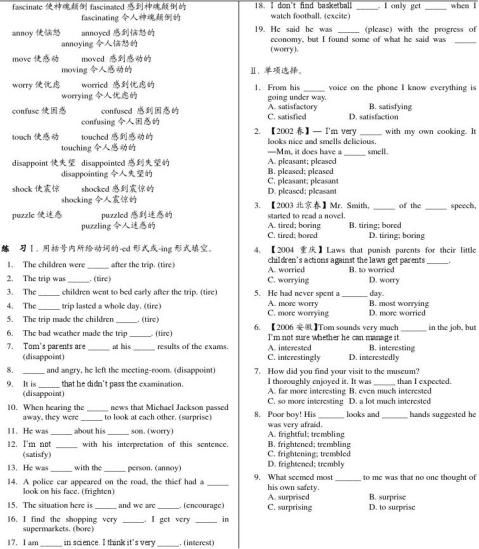
第3讲 其他相关考点
考点1.
副词按意义分类
③ 时间副词
now 现在 then 当时 tomorrow在明天
soon 不久
yesterday在昨天
① 方式副词
suddenly突然地 rapidly迅速地 warmly热烈地 successfully成功地 quickly很快地 ② 地点、方向副词
here 这里 there 那里 outside 在外边 away 远离 straight径直地 upstairs上楼
④ 频度副词(又称:频率副词)
always 总是 usually 通常 frequently频繁地 often 经常 sometimes有时 seldom 很少 ⑤ 程度副词
very 非常 quite 十分 too太 pretty 相当 rather稍微 extremely极端地 almost几乎
考点2.
静态形容词和动态形容词
C. as an art much as D. as much an art as
静态形容词:描绘的是人或物在静态下表现出的特征,如tall, big, deep, ugly, beautiful等。大多数形容词都是静态的。
动态形容词:描绘的是人或物通过行为活动才能表现出来的特征。(答疑qq 329950885)如: adorable, calm, cheerful, generous, gentle, loyal, nice, noisy, playful, reasonable, rude, shy, slow等。
① 动态形容词可用于进行时,而静态形容词不可以。如:
She is being nice to me.她现在对我很好。但不可说:She is being tall. ② 动态形容词可用于以动be词开头的祈使句,而静态形
容词不可以。例如可以说:Be patient! Be careful! 不可以说:Be tall! ③ 动态形容词可用于使役结构,而静态形容词不可以。例
如可以说: I persuaded her to be generous.不可以说: I persuaded her to be pretty. 1. 【2011全国I】I wasn’t sure if he was really interested or if
he ______ polite. A. was just being B. will just be C. had just been D. would just be 考点3.
too, so, how, that, as ﹢形容词﹢a/an﹢名词
8. 【1995全国】Can you believe that in ______ a rich country
there should be ______ many poor people? A. such; such B. such; so C. so; so D. so; such 9. 【1998上海】 It is ______ work of art that everyone wants to have a look at it. A. so unusual B. such unusual C. such an unusual D. so an unusual 10. 【2009上海】The Great Wall is ______ tourist attraction that millions of people pour in every year. A. so a well-known B. a so well-known C. such well-known a D. such a well-known 考点4.
形容词顺序
几个并列的形容词作定语,其语序通常为:限定语(the, a, this)+数量词(two)+ 描绘性形容词(beautiful, good, strong) + size(大、小big)+ shape(形状round)+ age(年龄、时间new, young)+ color(颜色)+ origin(国籍、来源)+ material(材料)+ purpose(用途目的)+ 名词。如: a heavy black Chinese steel umbrella;
the man’s first two interesting little red French oil paintings。 可以按这种方法记忆:限数描,形(大小形状)龄色,国材用。
可以谐音为: 献树苗,形龄色,我才用。(你向我献树苗,我要先看一下树苗的大小形状树龄和颜色,然后再决定我用还是不用。“形”,先“大小”后“形状”。)
也可以按下面的方法记:
限定 描述 大长高,形状 年龄与新老; 限数 描 (大小) 形 龄 颜色 国籍 出材料,用途 类别往后靠。 色 国 材 用 11. He likes going fishing. He usually uses a ______.
A. bamboo long fishing pole B. long bamboo fishing pole
C. pole long bamboo and fishing D. bamboo fishing long pole 12. 【1995全国】—How was your recent visit to Qingdao?
—It was great. We visited some friends, and spent the ______ days at the seaside. A. few last sunny B. last few sunny C. last sunny few D. few sunny last 13. 【2013上海】It’s a ________ clock, made of brass and dating from the nineteenth century. A. charming French small B. French small charming C. small French charming D. charming small French 14. 【2004浙江】______ students are required to take part in the
boat race.
A. Ten strong young Chinese B. Ten Chinese strong young C. Chinese ten young strong D. Young strong ten Chinese 15. 【2004江苏】The ______ house smells as if it hasn’t been
lived in for years.
A. little white wooden B. little wooden white C. white wooden little D. wooden white little 16. 【2005北京】 This ______ girl is Lind’s cousin.
A. pretty little Spanish B. Spanish little pretty C. Spanish pretty little D. little pretty Spanish
看下列几个短语: a good boy a hot day a tall tree a beautiful flower a good gift
so good a boy
too hot a day that tall a tree how beautiful a flower as good a gift
可以看出:单个形容词修饰名词,冠词放在形容词的前面;
如果形容词被so, too, that, how, as等词修饰时,(答疑qq 329950885)冠词则放在形容词后面。 要掌握下面的同义转换:
What a good boy he is!He is as good as his brother.
The boy is too short to be a basketball player. 2. Alice was ______ girl to express herself.
A. a much too shy B. too much shy a C. so shy a D. much too shy a 3. I’m afraid I’ll turn to Prof. Timlingson. It is ______. A. too difficult a problem B. a too difficult problem C. so difficult problem D. a so difficult problem
4. 【1992上海】 ______ box cannot be lifted by a boy of five.
A. So a heavy B. So heavy a C. A such heavy D. Such heavy 5. 【2003北京】Our neighbor has ______ ours. A. as a big house as B. as big a house as C. the same big house as D. a house the same big as 6. 【2012四川】 I make $2,000 a week; 60 surely won’t make ______ difference to me. A. that a big B. a that big C. big a that D. that big a 7. It is generally believed that teaching is ______ it is a science. A. an art much as B. much an art as
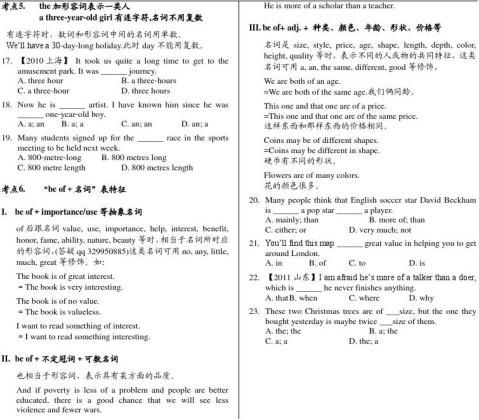
第4讲 几个常用形容词、副词的用法
考点1.
some与any的特殊用法
—Sorry, I haven’t got ______ myself. A. some; any B. any; any C. any; some D. some; some
2. —When shall we meet again?
—Make it ______ day you like; It’s all the same to me. A. one B. any C. another D. some 考点2.
yes和no要根据实际情况来选择
一般用法:
some, any可与单、复数可数名词及不可数名词连用。some一般用于肯定句,any多用于疑问、否定或条件句。 特殊用法:
① any用于肯定句表示“任何”的意思。
Any child can do that.(定语)
You may take any of them.(宾语) ② some用于单数可数名词前表示“某一”。
Smith went to some place in England.(定语) ③ 在表示请求、邀请、征求意见等问句中,用some。
Would you like some bananas?(邀请)
Mum, could you give me some money?(请求) ④ some和any在句中还可作状语,作副词。some意为“大
约”, 相当于“about”; 而any则表示程度,意为“稍,丝毫”, 可以修饰比较级。如:
There are some 300 workers on strike. Do you feel any better today? 1. —Would you lend me ______ paper to write on?
yes和no容易用混的情况主要出现在:反义疑问句中,否定的一般疑问句和对陈述句的评论上。
技巧:把问题转化为含有(答疑qq 329950885) “有没有”“是不是”等的问题,再看是用yes还是用no。 在英语中,不管用肯定疑问句来问还是用否定疑问句来问,回答是一样的。
回答时,前后是一致的,即:只能说:Yes, it is. / No, it isn’t. 不会出现:Yes, it isn’t. / No, it is.这样的情况。 在反义疑问句中:
① —He isn’t from England, is he? —______. He is from London.
A. No, he is B. No, he isn’t C. Yes, he is D. Yes, he isn’t
② —He is from England, isn’t he?
— ______. He is from London. A. No, he is B. No, he isn’t C. Yes, he is D. Yes, he isn’t 分析:两个句子都可转换为“他是不是英国人?”。从后文“来自伦敦”可以看出“是英国人”。因此都选择C。 在否定的疑问句中:
①—Haven’t you been to Hong Kang? —______. I went there last year. A. Yes, I have B. No, I have C. Yes, I haven’t D. No, I haven’t ②—Have you been to Hong Kong? —______. I went there last year. A. Yes, I have B. No, I have C. Yes, I haven’t D. No, I haven’t
分析:首先排除矛盾选项B和C。两句都可转换为“你是不是去过香港?”。从后文中可以看出是“去过”。因此都要选肯定回答A。 在对陈述句的评论中:
①— I hear John doesn’t treat his wife well. —______.He often beats her. A. Yes B. No
②— I hear John doesn’t treat his wife well.
—______.He thinks she is the loveliest wife in the world. A. Yes B. No 分析:在①中,句子可转换为“他对待妻子是好还是不好?”。从后文可以看出“不好”。因此选B。在②中,从后文可以看出“他对待妻子肯定很好”,因此选A。 3. —She wouldn’t drink her medicine last night, would she?
—______.
A. No, but I wish she wouldn’t B. No, but I wish she had C. Yes, I wish she drank D. Yes, I wish she could 4. —Don’t go there, it’s too dangerous!
— ______.
A. Yes, I won’t B. No, I weren’t C. No, I can’t D. No, I won’t
5. 【2010四川】—I’m sorry. That wasn’t of much help. —Oh, ______. As a matter of fact,it was most helpful. A. sure it was B. it doesn’t matter C. of course not D. thanks anyway 6. 【1997上海】— ______. —Thank you, I certainly will. A. Happy birthday to you
B. Let me help you with your math C. Please remember me to your mum D. Don’t forget to post the letter
7. Hasn’t your son graduated from college?
______ . To find a suitable job isn’t easy nowadays.
A. No, get down to it B. No, you hit the point C. Yes, face up to it D. Yes, that’s the problem 8. 【2006重庆】—Mr. Gordon asked me to remind you of the meeting this afternoon. Don’t you forget it! —OK, I ______ .
A. won’t B. don’t C. will D. do 考点3.
no 的特殊用法
① no修饰名词,相当于not a或not any。
作形容词修饰名词单数时,等于not… a; 修饰可数名词复数或不可数名词时等于not… any. I have no pen. = I don’t have a pen. I have no pens. = I don’t have any pens. I have no money. = I don’t have any money.
可以看出:名词前没有a, any时,用no构成否定;名词前有a, any时,用not构成否定。
另外,no A or B = no A and no B。
I have no pen or paper.= I have no pen and no paper. 9. As I know, there is ______ car in this neighborhood.
A. no such B. no a C. not such D. no such a 10. 【2010重庆】 Everything comes with ______ price; there is no such ______ thing as free lunch in the world. A. a; a B. the; / C. /; the
D. a; /
② no修饰比较级,译为“……不到哪儿去”。
He is no taller than him.他比他高不到哪儿去。(他和他一样矮)
My English is no better than yours.
我的英语比你的好不到哪儿去。(一样差) ③ 用于表示惊奇、怀疑或不信。
He left yesterday. No. 他昨天走了,不会吧! ④ no =not at all,意思是“完全不是,绝不是”。
His father is no teacher. 他的父亲绝不是教师。 It is no easy task. 这根本不是轻而易举的工作。 It is no joke. 这绝不是开玩笑的事。 ⑤ 在“no+动名词”的省略句中,表示“禁止,不准”的意思。
No smoking!禁止吸烟!
No spitting on the floor!不要随地吐痰! ⑥ 用于there is no+v-ing(动名词)的结构中。(参看P. 错
误!未定义书签。错误!未找到引用源。)。意为“丝毫不能;简直没有办法”。如: There is no denying his honesty. 他的诚实是丝毫不可否认的。
There is no saying what may happen. 简直不知道今后会发生什么事。 ⑦ 用作名词,有单、复数之分,意为“不;否定”。
Once he had made up his mind to do something, he would not take “no” for an answer.
一旦他决定做某事,别人就是再说也没有用。 考点4.
enough, else, present的位臵
enough修饰形容词和副词时放在所修饰词之后, 修饰名词时有时放在所修饰词之前, 有时放在所修饰词之后。else常放在不定代词和疑问词之后。present做“出席”讲是形容词, 要放在所修饰词之后。精品-高中英语语法通霸-3.形容词和副词常考点区别用法分类专项总结归纳讲解与高考真题练习题及答案.doc
11. 【2000全国】______ to take this adventure course will
certainly learn a lot of useful skills. A. Brave enough students B. Enough brave students C. Students brave enough D. Students enough brave 12. 【2002北京】All the people ______ at the party were his
supporters.
A. present B. thankful C. interested D. important 13. 【1998全国】If I had ______, I’d visit Europe, stopping at
the small interesting places.
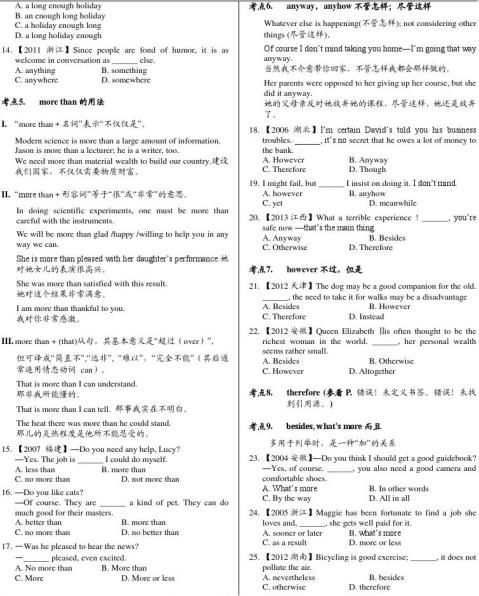
考点1.
late 和later
考点2.
pleased, pleasing与pleasant
He is late. He is half an hour late.
Three minutes later, he arrived. It will be rainy later on.
pleased的含义是“感到满意,高兴”,后常跟介词at, with。如:
I’m pleased to see you here.在这儿见到你很高兴。 She’s pleased with our programme.
她对我们的节目很满意。
pleasing表示“令人欣喜的”,相当于“giving pleasure”。这个问题值得讨论。
The land is worthy to be used. 如:
My sister’s progress in dancing is pleasing. 我姐姐在舞蹈方面的进步令人高兴。 The baby has a pleasing voice. 这个婴儿的声音很悦耳。
pleasant表示“快乐的,愉快的”。如: The girl has a pleasant childhood. 这个女孩有一个快乐的童年。
To have a pleasant holiday is my favorite. 过一个愉快的假期是我最喜欢的。 考点3.
living, alive与live
living作定语时,既可臵于所修饰的名词之前,也可臵于所
修饰的名词之后,译为“活着的,当代的”。在句中充当定语及表语。如:
He is the greatest living writer in America. 他是当今美国最伟大的作家。
Not all living things live on sunlight. 并非所有的生物都依赖阳光生存。 My grandparents are still living. 我的祖父母仍然健在。
alive译为“活着的”,可以在句中作表语及定语。作定语时,(答疑qq 329950885)位于它所修饰的名词之后。如: He may be the busiest person alive. 他可能是世上最忙的人了。 Is that sheep dead or alive? 那头羊是死了还是活着?
alive还有“活泼的,活动的,有生机的”之意。如: You seem very much alive today. 你今天看起来很活跃。
live表示“活着的”,做“现场直播”讲时可以用作形容词、副词,在句子中可以作定语、表语。
Have you seen a live whale? 你见过活的鲸鱼吗?
The programme is live. /The programme is broadcast live. 这个节目是现场直播的。
1. —What a pity! I’ve not got a ticket for the football match.
—Don’t worry. It’ll be broadcast ______. A. live B. lively C. alive D. living 考点4.
big与large
big用得比较广泛,可以与large换用,另外还可以表示“伟
大”、“巨大”、“重要”之意。large着重指“体积,容积”之大。如:
There is a large garden in our town. 我们镇上有一个大花园。
Is there a big tree in front of your house? 你的房子前有一棵大树吗?
It’s said that he is a big man.据说他是一个大人物。 考点5.
worth, worthy与worthwhile
worth意为“值得的”,后接v-ing形式,构成“be worth
doing”结构,也可接表示价格的名词及钱数。worthy意为“值得的”,后接“of+名词(或being+过去分词)”,构成“be worthy of+名词(或being done)”结构或“be worthy to be done”结构。如:
The book is well worth reading. 这本书很值得一读。
This coat is worth one hundred yuan. 这件上衣价值一百元。
This problem is worthy of being discussed.
这块地值得开发。
worthwhile意为“付出时间、金钱或努力是值得的”。可以作表语、定语、补语;it作形式主语时,后面真正主语可以用不定式也以可用动名词。如: She considers teaching a worthwhile career.
If you need him on this project, you’ve got to make it financially worthwhile for him It is worthwhile buying the dictionary. It is worthwhile to discuss the plan again.
worthwhile (答疑qq 329950885)也可分开写,此时,中间也可加上物主代词。如:
I’d think it worth while to go. 我认为值得去。
Would you like to do some gardening for me? I’ll make it worth your while.
2. 【济南统考】 Oh, boy, why are you killing your time this
way? Can’t you find something ______ doing at all? A. useful B. valuable C. worth D. good 考点6.
ago与before
ago表示以现在为起点的“以前”;before指以过去或
将来的某时刻为起点的“以前”。泛指“以前”用before而不用ago。
He came here three days ago.
He said he had come three days before. 考点7.
too, also与either
too和also用于肯定句、疑问句,too多用于口语,also多用于书面语;either用于否定句。too常用在句末,also常用在句中。
3. 【1983全国】—I haven’t been to Guilin yet.
—I haven’t been there, ______. A. too B. also C. either D. neither 4. 【2013福建】A society cannot be successful if it throws tradition away, but it cannot be successful ______if we do something to stop progress. A. either B. neither C. too D. also 考点8.
good与well
good是形容词。well一般用作副词,作形容词时,只能在系动词后作表语,表示“身体状况好”。
5. 【1993全国】—Mum, I think I’m ______ to get back to
school.
—Not really, my dear. You’d better stay at home for another day or two. A. so well B. so good C. well enough D. good enough 考点9.
real与true
形容词表“真的”。real强调真实存在的而不是幻想的,在句中常作定语;true指与事实标准和实际情况相符合,在句中作表语或定语。 考点10. hard与difficult
均表“困难”,但hard通常指体力上困难,difficult则指智力或技能上的困难,困难程度大于hard。它们都可作定语或表语。
The exam is difficult. It’s hard work.

第6讲 几组常考形容词、副词词组的区别
考点1.
修饰可数名词、不可数名词、既可修饰可数又可修饰不可数名词的短语(参看P. 错误!未定义书签。错误!未找到引用源。) many more + 名词,much more + 名词,与another
如果把前五句中的more去掉后就构成了many /three /a few
chairs 和 some /much meat。
因此我们可以看出,more 在这里是形容词,用在名词和它的数量修饰语中间,表示在原来基础上“还,额外”。因此,在这种情况下more前用many, a few还是用much, a little取决于后面的名词是可数还是不可数。 此时可以与another互换用。如:
We have forty chairs now, but we still need five more chairs. We have forty chairs now, but we still need another five chairs. 1. Some fish are dead in this lake and ______ more are sick.
A. much B. many C. a little D. a bit 2. 【2006全国3】—Did you take enough money with you? —No, I needed _______ I thought I would. A. not so much as B. as much as C. much more than D. much less than 3. 【2007 安徽】The school’ s music group will be giving a big show tomorrow night and two ______ on the weekend. A. more B. other C. else D. another 考点2.
We need many more chairs. 我们还需要许多椅子。
We need three more chairs. 我们还需要三张椅子。 We need a few more chairs. 我们还需要几张椅子。 We need some more meat. 我们还需要一些肉。 We need much more meat. 我们还需要很多肉。 This book is more interesting than that one. 这本书比那本书有趣。
This book is much more interesting than that one. 这本书比那本有趣得多。
前五个句子中的more和后两个句子中的more有什么不同? (前五句中的more后面是名词,不是构成形容词的比较级。而后两句中的more后面是多音节形容词,是构成比较级。)
4. 【2000全国】If you want to change for a double room
you’ll have to pay ______ $ 15. A. another B. other C. more D. each 5. 【2012北京】Many people have donated that type of blood; however, the blood bank needs ______. A. some B. less C. much D. more 考点3.
as many as, as much as; as far as, as long as
14. 【2003上海】—How far apart do they live? —______ I
know, they live in the same neighborhood. A. As long as B. As far as C. As well as D. As often as 15. 【2004安徽春】______ I can see, there is only one possible way to keep away from the danger. A. As long as B. As far as C. Just as D. Even if 16. 【2005安徽】John is the tallest boy in the class, ______ according to himself.
A. five foot eight as tall as B. as tall as five foot eight C. as five foot eight tall as D. as tall five foot eight as 17. 【2005湖南】The more I think about him, the more reasons
I find for loving him ______ I did. A. as much as B. as long as C. as soon as D. as far as 18. 【2006上海】A typhoon swept across the area with heavy rains and winds ______ strong as 113 miles per hour. A. too B. very C. so D. as 考点4.
no more than与no less than, not more than
用many还是用much关键是看所描述名词本身的性质
而不是量词的单复数。
① as much as + 不可数名词数量。
Each stone weighs as much as fifteen tons. She could earn as much as ten dollars a week. He weighs as much as 100kg. ② as many as + 可数名词数量,“多达”。
I have as many as sixteen reference books.
As many as 100 people were killed in the air crash.
(链接:so little /few / many/ much参看P. 错误!未定义书签。错误!未找到引用源。)
6. Sorry I haven’t been able to do ______ I should.
A. as many as B. as much as C. as far as D. more than 7. ______ 1, 000 people were killed in the battle. A. As much as B. As many as C. As long as D. As far as 8. We need ______ $10,000 now. A. as much as B. as many as C. as long as D. as far as
9. In the summer months the difference in temperature between London and the north can be ______ nine degrees. A. as much as B. as many as C. as long as D. as far as 10. I had invited 50 guests to the party, but actually twice ______ came. A. more than B. as many C. as much D. less than 11. 【2008浙江】 I like this jacket better than that one, but it costs almost three times ______. A. as much B. as many C. so much D. so many 此类词组还有:
as long as+数字+名词 (长达……); as wide as+数字+名词 (宽达……); as high as+数字+名词 (高达……); as early as+数字+名词 (早在……); as late as+数字+名词 (迟在……)等。
I have been learning English (for) as long as 15 years. He came home as late as two in the morning. I saw your brother as late as last week. The river is as wide as 100 meters. I mailed the letter as early as Friday.
12. 【2010上海】In ancient times, people rarely travelled long
distances and most farmers only travelled ______ the local market.
A. longer than B. more than C. as much as D. as far as 13. 【2003上海】After supper she would sit down by the fire, sometimes for ______ an hour, thinking of her young and happy days. A. as long as B. as soon as C. as much as D. as many as
① no more than =only“不超过,只有,仅仅,只不过”, 暗
含有“少”的意思,有主观意味。
There are no more than a hundred people in the hall. 大厅里只有100人。 ② not more than=at the most“不超过,至多”,只是客观
描述。如:
There are not more than a hundred people in the hall. 大厅里不超过100人。 ③ no less than“多达,不少于”, 暗含有“多”的意思, 有主
观意味。
He made no less than£500. 他赚了多达五百英镑的钱。
He walks no less than five miles to school. 他上学至少要走五英里。 19. I’m glad to say that he’s already finished _____ 50% of the
book in these three days. A. no less than B. no more than C. not more than D. much less than 考点5.
before long与long before
before long是副词短语,意为“不久”, 近义于soon。 long before用法有两种情况:
① before引导时间状语从句,表示“在……之前”, 而long修饰(答疑qq 329950885)这个时间状语从句, 表示“在这之前很久就……”。如: He had left here before I came. 在我来之前他就走了。
He had left here long before I came. 在我来之前很早他就走了。
② long before是一个副词短语,意为“很久以前”。 She said she had seen the film long before. 她说她很久以前就看过这部电影。
20. I had worked here ______ you came here. But I shall leave
for England ______.
A. before long; before long B. before long; long before C. long before; before long D. long before; long before
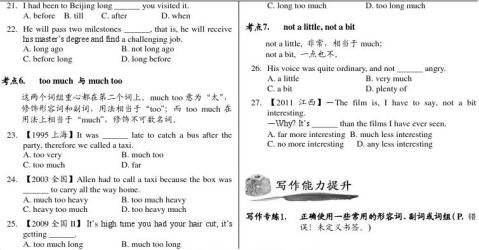
考点1.
20xx年以前
1. The new research team was led by the ______ engineer.
A. main B. major C. chief D. primary 2. — Why did she spend so much time searching shop after shop for a blouse?
— Oh, she was very ______ about her clothes. A. special B. particular C. especial D. unusual 3. It’s very ______ to let the old have seats on the bus. A. thoughtful B. useful C. careful D. funny 4. She was robbed of her handbag with the ______ sum of $5,000 in it.
A. extraordinary B. important C. considerable D. valuable 5. —Haven’t they apologized to you yet?
—No explanation was offered, ______ an apology! A. still less B. neither C. not D. or rather
6. —Dr. White has got plenty of information about UFO. He’s promised to offer it to me.
—I have as much. Would you like to have mine ______? A. as well B. as possible C. so far D. if so 7. Li Ping is the ______ man I want to see. A. last B. laster C. lastest D. latter
8. The patient is supposed to go to the hospital for ______ checks.
A. common B. normal C. regular D. usual 9. Nuclear science should be developed to benefit the people ______ harm them. A. more than B. rather than C. other than D. better than 10. A ______ man came to see you this morning. But I don’t know him. A. sure B. surely C. certainly D. certain
11. The Chinese Educational Department suggests teachers
should receive ______ education to catch up with the ______ development.
A. farther; late B. farther; later C. further; lately D. further; latest 12. He was the ______ at that moment.
A. only awake person B. only person awake C. awake only person D. person only awake 13. What he has done is far from ______.
A. satisfactory B. satisfied C. satisfaction D. satisfy
14. 【2001北京春】I am surprised that you should have been fooled by such a(an)______ trick. A. ordinary B. easy C. smart D. simple 15. 【2004天津】Mr. Smith used to smoke ______ but he has given it up. A. seriously B. heavily C. badly D. hardly 16. 【2004上海春】 The elderly need special care in winter, as they are ______ to the sudden change of weather A. sensitive B. sensible C. flexible D. positive 17. 【2004广西】When we plan our vacation, mother often offers ______ suggestions. A. careful B. practical C. effective D. acceptable 18. 【2005福建】―Why didn’t you buy the camera you had longed for?
―I had planned to, but I was £50 ______. A. fewer B. less C. cheap D. short 19. 【2005上海】There was such long queue for coffee at the interval that we ______ gave up. A. eventually B. unfortunately C. generously D. purposefully 20. 【2005浙江】My mother always gets a bit ______ if we don’t arrive when we say we will.
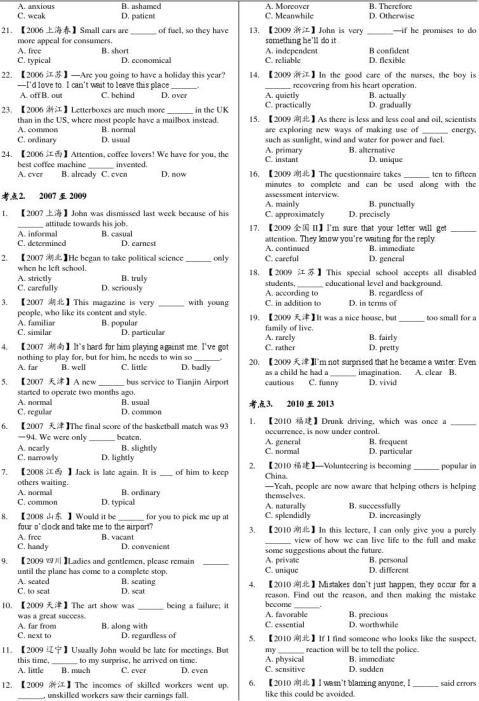
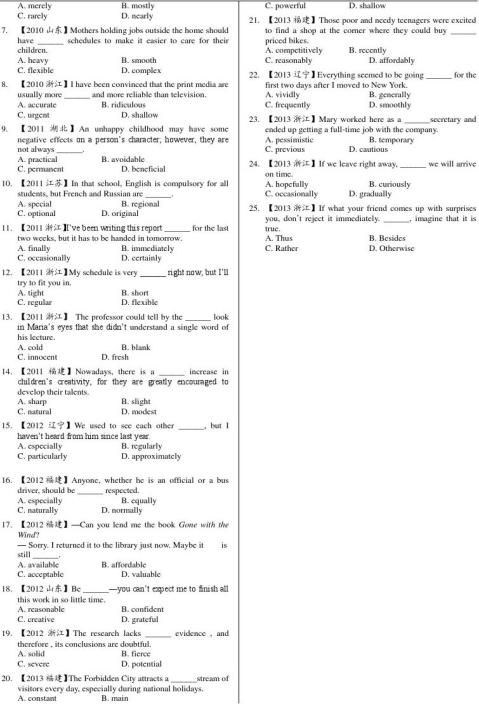
答案:
第三章 形容词和副词
第1讲 形容词和副词的选用
Ⅰ.1. easy, easily。前面作表语用形容词,后面修饰动词work out,用副词。
2. strong, strongly。前面作定语用形容词,后面修饰动词blew,用副词。
3. happy, happily。(答疑qq 329950885)前面作time的定语用形容词,后面修饰动词play,用副词。
4. beautiful, beautifully。前面girl的定语用形容词,后面修饰动词sings,用副词。
5. angrily。修饰动词said用副词。
6. Surprisingly。修饰整个句子,指他安然无恙地到家这个事令人吃惊。
7. Hopefully。修饰整个句子,指“但愿,希望,可能这样”。
8. Luckily。修饰整个句子,指他通过这次考试很幸运。
9. terribly, terribly。修饰形容词ill和sorry用副词。
10. extremely, especially。修饰形容词cold和important用副词。
11. incredible,incredibly。前面作定语用形容词,后面修饰副词well用副词。
Ⅱ. 1. slowly 2. strange 3. loudly 4.horrible
5. quickly 6. terrible 7. carefully 8.anxious
9. badly
Ⅲ. 1. A 2. B 3. C 4. C 5. A
6. C 7. C 8. C 9. C 10. B
11. B 12. C
考点2和考点3
1. D 2. B 3. B 4. B
6. D 7. D
第2讲 -ed形容词与-ing形容词
Ⅰ. 1. tired 2. tiring 3. tired 4.tiring
5. tired 6.tiring 7.disappointed; disappointing
8. disappointed 9. disappointing
10. surprising; surprised 11. worried; worrying
12.satisfied 13. annoyed; annoying
14. frightened 15. encouraging; encouraged
16.boring; bored 17. interested, interesting
18. exciting; excited 19. pleased; worrying
Ⅱ. 1. C 2. D 3. A 4. A 5. C
6. A 7. A 8. B 9. C
第3讲 其他相关考点
1. A 2. D 3. A 4. B
6. D 7. D 8. B 9. C
11. B 12. B 13. D 14. A
16. A 17. C 18. D 19. A
21. B 22. D 23. B
第4讲 几个常用形容词、副词的用法
1. A 2. B 3. B 4. D
6. C 7. D 8. A 9. A
11. C 12. A 13. A 14. C
16. B 17. B 18. B 19. B
5. A 5. B 10. D 15. A 20. B 5. A 10. D 15. B 20. A
21.
第5讲 几组常考形容词、副词的区别
1. 6. 11. 16.
A A C C
2. 7. 12. 17.
C B B C
3. 8. 13. 18.
C A C A
4. 9. 14.
A D D
5. 10. 15.
C C B
B
22.
C
23.
A
24.
B
25.
B
第6讲 几组常考形容词、副词词组的区别
第7讲 近几年高考题选 20xx年以前
2007至2009
2010至2013
1. B 2. 6. B 7. 11. A 12. 16. B 17. 21. A 22. 26.
C
27.
1. C 2. 6. A 7. 11. D 12. 16. A 17. 21.
D
22.
1. B 2. 6. C 7. 11. B 12. 16.
C
17.
1. B 2. 6. A 7. 11. C 12. 16. B 17. 21.
D
22
C 3. B 8. D 13. A 18. C 23. A
B 3. A 8. B 13. B 18. C
23.
D 3. D 8. C 13. B
18.
D 3. C 8. A 13. A 18. D
23
A 4. A 9. A 14. D 19. B 24.
A 4. C 9. A 14. D 19. A
24.
B 4. D 9. C 14. B
19.
B 4. A 9. B 14. A 19. B
24
A 5. A 10. B 15. A 20. A 25.
C 5. B 10. D 15. A 20. A
D 5. A 10. D 15. C
20.
D 5. C 10. A 15. A 20. A
25
D B B C B
A D B A
C A B D
B C B A C
-
形容词副词用法总结
形容词副词用法总结一形容词的基本用法形容词是用来描写或修饰名词或代词的一类词在句中用作定语表语补语和状语1作定语就是放在名词前面的…
-
形容词的用法(基础知识)
形容词的用法真题再现1WhichcityhaspopulationBeijingGuiyangorXingyi20xx黔西南Xin…
-
形容词和副词用法总结归纳讲解
第三章形容词用来修饰说明名词或不定代词表示人或物的性质特征和状态而副词是用来修饰动词形容词其他副词或整个句子有时也能修饰名词表示时…
-
形容词比较级和最高级的用法 总结
SBS二册复习资料:形容词比较级的用法整理:SophieA.在形容词比较级前还可以用much,even,far,alot,stil…
-
初中形容词用法简单归纳及练习
形容词精讲精练形容词的三级口诀形容副词分三级原比最词形变化有规律单音erest多音more和most一个辅音要双写辅音后y改i特殊…
-
形容词比较级和最高级的用法 总结
SBS二册复习资料:形容词比较级的用法整理:SophieA.在形容词比较级前还可以用much,even,far,alot,stil…
-
形容词副词用法总结
形容词副词用法总结一形容词的基本用法形容词是用来描写或修饰名词或代词的一类词在句中用作定语表语补语和状语1作定语就是放在名词前面的…
-
特殊形容词用法小结
几个形容词的特殊用法1most同形容词连用而不用the表示quot极很非常十分quotIt39smostdangeroustobe…
-
德语形容词用法大总结
形容词在做定语时必须按照名词的性数格加上不同的词尾1与定冠词连用的形容词的变格规则阳性名词第一格阴性和中性名词第一第四格词尾为e其…
-
初中形容词及副词用法总结及练习
形容词和副词用法总结及练习一形容词的用法一概念形容词修饰名词说明事物或人的性质或特征通常可将形容词分成性质形容词和叙述形容词两类其…
-
复合形容词总结
复合形容词从词法角度看,复合形容词有以形容词为中心、以动词的分词为中心、以名词(包括名词+后缀-ed)为中心、以及介词短语四大类型…